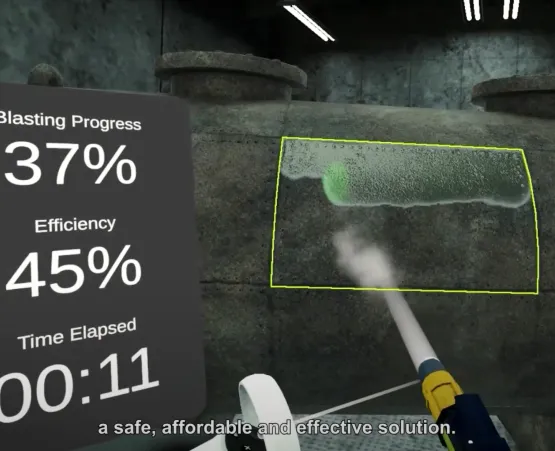In the face of growing demand for safer, more accessible trades training, a team of students from the Master of Digital Media (MDM) program has developed a virtual reality (VR) simulation designed to bridge the gap between theory and practice in one of the more technical and higher-risk processes in construction and manufacturing industries: sandblasting.

The project, titled BlastSimXR, emerged from a partnership with a frequent collaborator in the training simulation space, Vancouver Community College (VCC), where students were tasked to address a big challenge in the school’s sandblasting apprenticeship program—a lack of safe, hands-on training opportunities. Limited access to equipment, geographic constraints, and safety concerns had long hampered the traditional instructional model.

“After we conducted market and competitor research, it became clear there was a gap in interactive training solutions,” Div Wang, MDM student and UI/UX designer, said. “The existing approach lacked immersive, hands-on engagement, which made it harder for students to feel prepared for exams or real-world industrial work.”
A New Approach to Hands-On Learning
To meet this challenge, the student team designed a fully interactive VR experience using Unity and the Oculus SDK, simulating the sandblasting process with real-time feedback and tactile immersion. The system includes physics-based environments, intuitive hand tracking, and surface shaders that dynamically respond to user actions—transforming rusted or dirty materials into clean surfaces as the simulation unfolds.
“We wanted students to get immediate visual feedback as they work,” Akela Huang, MDM student and project manager, explained. “That sense of interaction is crucial to learning technical skills.”
Unity’s particle system was leveraged to render the blasting effect from the nozzle, ensuring a sense of realism. The result was a safe, scalable, and highly effective training tool that brings complex industrial processes into the digital realm.
Bringing MDM into the Field
While their technical execution was impressive, the students credit their success equally to the power skills developed through the MDM.
“Communication, adaptability, and time management were as essential as any coding technique,” Darsh Mittal, MDM student and 3D artist, said. “From aligning on goals to staying connected with our client, these skills we developed in the program helped us meet tight deadlines and navigate unfamiliar technical terrain.”
The team had no prior experience with sandblasting, so they immersed themselves in the subject by completing VCC’s online training and making two site visits to observe real-world sandblasting procedures.
“Seeing the process firsthand and speaking with experts helped us visualize the workflow and safety concerns, which we then translated into the simulation,” said Rita Chu, MDM student and VR developer.
Meeting Industry Standards Through Testing and Iteration
The team also collaborated closely with subject matter experts to ensure the training module met both educational and industry expectations. Informed by those conversations, they introduced key performance metrics—such as area coverage, time used, and efficiency score—that track trainee progress in real time.
To validate the simulation’s usability and accuracy, they conducted two rounds of user testing, incorporating feedback from users with industrial experience.
“Those sessions helped us iterate quickly, especially around the interface and user experience,” Alicia Rui, MDM student and VR developer, said. “Our goal was always to make the simulation reflect the real workplace.”
“Collaborating with these MDM students was genuinely refreshing and inspiring,” said Brett Griffiths, Dean of the School of Trades, Technology and Design at VCC. “Their methodical approach impressed me—particularly how they combined technical expertise with creative problem-solving to address our real-world apprenticeship training challenges.”
Recognition on an International Stage
In April 2025, the team presented BlastSimXR at HarvardXR, an emerging tech showcase at Harvard University that brings together global innovators in extended reality (XR).

“From the start, we believed in this project,” Martin Curic, Simon Fraser University visiting student and software developer said. “We never saw it as just another assignment—it was a chance to build something meaningful. So, presenting it at HarvardXR was incredibly rewarding.”
The simulation was met with enthusiasm from attendees, including Robin Shahida product manager and engineer at the University of Bridgeport, who noted the simulation’s novelty and market potential. Others, like Boston VR Meetup co-organizer Casey Armstrong, offered to share the project within their networks, recognizing its unique contribution to the XR training space.

A Glimpse Into the Future of Workforce Training
Looking ahead, the team sees their work as part of a broader shift toward immersive training in industrial sectors—especially as XR and AI continue to converge.
“We believe VR will play an increasingly central role in essential skills training,” Akela said. “Our simulation shows how interactive technology can prepare workers more effectively and safely. It’s a scalable solution we hope can be adapted to other trades.”
Brett echoed this sentiment, underscoring the broader implications of the collaboration. “This partnership exemplifies how academic-industry collaboration can solve problems traditional methods can’t,” he said. “The students brought cutting-edge VR expertise to transform a hands-on process into something scalable and accessible. It’s a win for innovation, for students, and for industry training.”
For a team of students with no prior exposure to the sandblasting trade, their innovation not only answered the challenge—it redefined what training in that space could look like.

Meet the Students
- Akela Huang, Project Manager
- Alicia Rui, VR Developer
- Darsh Mittal, 3D Artist
- Div Wang, UI/UX Designer
- Edwin Chow, Software Developer
- Martin Curic, Software Developer
- Rita Chu, VR Developer
Faculty Supervisor
Sabrina Clamagirand
About Vancouver Community College
Vancouver Community College (VCC) is a public post-secondary institution offering hands-on, career-focused education in the heart of downtown Vancouver. With a strong emphasis on applied learning, VCC delivers programs in fields such as culinary arts, health sciences, design, business, and trades. The college is known for its close ties to industry, diverse student body, and commitment to community-driven education and skills training.
